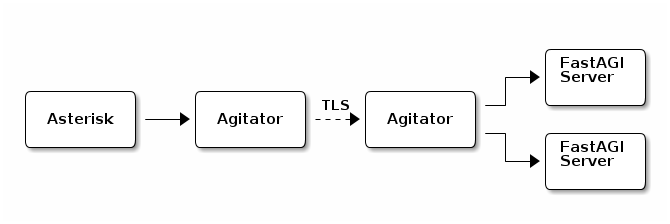A reverse proxy for the FastAGI protocol
Features:
- Request based routing
Routes FastAGI sessions depending on the request URI.
- Load balancing
Distributes load evenly between FastAGI servers based on the number of active sessions or in a Round-Robin fashion.
- HA - Failover
Routes traffic to stand-by servers when main server is not reachable, or has reached the number of maximum allowed sessions.
- TLS
Offers strong encryption support for FastAGI sessions.
- On the fly config reloading
Routing rules can be reloaded/altered on the fly without restarting the proxy or dropping any connections.
- Syslog integration
Can send logging and debug data to a syslog server.
To install:
go install github.com/zaf/agitator
To run:
agitator -conf=/path/to/conf.file
There is also a simple Makefile that installs the agitator binary in /usr/local/bin and its config file in
/usr/local/etc to help with system wide installation. Under the folder init
startup scripts are provided for systemd based systems, for Red Hat and Debian based systems that use the old sysV init
and for systems that use OpenRC.
Reloading the config file on-the-fly requires a Hangup signal to be sent to the agitator process. This can be done either by using the
init scripts provided or with something like pkill -HUP agitator. This reloads the routing settings from the config file.
To alter the general settings (like listening port or address) agitator must be restarted.
A graceful shutdown option is available where agitator stops accepting new requests but waits
for all active sessions to finish before exiting. To trigger it either use the init scripts
or send an Interrupt signal (pkill -INT agitator) to the agitator process.
Topology examples:
A typical layout where agitator sits between one or more asterisk servers and one or more FastAGI servers routing AGI requests providing load balancing and/or high availability:
Agitator can make up for asterisk's lack of encryption support on the AGI protocol either by wrapping AGI sessions in TLS, sending the traffic over the network, unwrapping it and contacting the FastAGI server:
or by encrypting AGI traffic and directly communicating with TLS aware FastAGI servers:
An example of such a FastAGI server can be found here, using the Go AGI package. A Perl implementation can be found here using Asterisk::AGI and Net::Server::PreFork.
See sample config file for configuration details.
Copyright (C) 2014 - 2015, Lefteris Zafiris zaf@fastmail.com
This program is free software, distributed under the terms of the GNU General Public License Version 3. See the LICENSE file at the top of the source tree.


